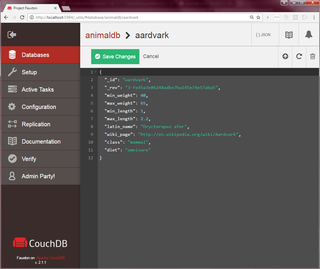In computing, Open Database Connectivity (ODBC) is a standard application programming interface (API) for accessing database management systems (DBMS). The designers of ODBC aimed to make it independent of database systems and operating systems. An application written using ODBC can be ported to other platforms, both on the client and server side, with few changes to the data access code.

SQLite is a database engine written in the C programming language. It is not a standalone app; rather, it is a library that software developers embed in their apps. As such, it belongs to the family of embedded databases. It is the most widely deployed database engine, as it is used by several of the top web browsers, operating systems, mobile phones, and other embedded systems.
Web development is the work involved in developing a website for the Internet or an intranet. Web development can range from developing a simple single static page of plain text to complex web applications, electronic businesses, and social network services. A more comprehensive list of tasks to which Web development commonly refers, may include Web engineering, Web design, Web content development, client liaison, client-side/server-side scripting, Web server and network security configuration, and e-commerce development.
In software engineering, service-oriented architecture (SOA) is an architectural style that focuses on discrete services instead of a monolithic design. By consequence, it is also applied in the field of software design where services are provided to the other components by application components, through a communication protocol over a network. A service is a discrete unit of functionality that can be accessed remotely and acted upon and updated independently, such as retrieving a credit card statement online. SOA is also intended to be independent of vendors, products and technologies.
OpenMAX, often shortened as "OMX", is a non-proprietary and royalty-free cross-platform set of C-language programming interfaces. It provides abstractions for routines that are especially useful for processing of audio, video, and still images. It is intended for low power and embedded system devices that need to efficiently process large amounts of multimedia data in predictable ways, such as video codecs, graphics libraries, and other functions for video, image, audio, voice and speech.

Canonical Ltd. is a UK-based privately held computer software company founded and funded by South African entrepreneur Mark Shuttleworth to market commercial support and related services for Ubuntu and related projects. Canonical employs staff in more than 70 countries and maintains offices in London, Austin, Boston, Shanghai, Beijing, Taipei, Tokyo and the Isle of Man.
The Data Distribution Service (DDS) for real-time systems is an Object Management Group (OMG) machine-to-machine standard that aims to enable dependable, high-performance, interoperable, real-time, scalable data exchanges using a publish–subscribe pattern.
Content Repository API for Java (JCR) is a specification for a Java platform application programming interface (API) to access content repositories in a uniform manner. The content repositories are used in content management systems to keep the content data and also the metadata used in content management systems (CMS) such as versioning metadata. The specification was developed under the Java Community Process as JSR-170, and as JSR-283. The main Java package is javax.jcr.
Google Developers is Google's site for software development tools and platforms, application programming interfaces (APIs), and technical resources. The site contains documentation on using Google developer tools and APIs—including discussion groups and blogs for developers using Google's developer products.

Apache CouchDB is an open-source document-oriented NoSQL database, implemented in Erlang.
Microsoft SQL Server is a proprietary relational database management system developed by Microsoft. As a database server, it is a software product with the primary function of storing and retrieving data as requested by other software applications—which may run either on the same computer or on another computer across a network. Microsoft markets at least a dozen different editions of Microsoft SQL Server, aimed at different audiences and for workloads ranging from small single-machine applications to large Internet-facing applications with many concurrent users.
Component Object Model (COM) is a binary-interface standard for software components introduced by Microsoft in 1993. It is used to enable inter-process communication (IPC) object creation in a large range of programming languages. COM is the basis for several other Microsoft technologies and frameworks, including OLE, OLE Automation, Browser Helper Object, ActiveX, COM+, DCOM, the Windows shell, DirectX, UMDF and Windows Runtime.

Ubuntu One is an OpenID-based single sign-on service operated by Canonical Ltd. to allow users to log onto many Canonical-owned Web sites. Until April 2014, Ubuntu One was also a file hosting service and music store that allowed users to store data "in the cloud".

An application programming interface (API) is a way for two or more computer programs or components to communicate with each other. It is a type of software interface, offering a service to other pieces of software. A document or standard that describes how to build or use such a connection or interface is called an API specification. A computer system that meets this standard is said to implement or expose an API. The term API may refer either to the specification or to the implementation. Whereas a system's user interface dictates how its end-users interact with the system in question, its API dictates how to write code that takes advantage of that system's capabilities.

OpenStack is a free, open standard cloud computing platform. It is mostly deployed as infrastructure-as-a-service (IaaS) in both public and private clouds where virtual servers and other resources are made available to users. The software platform consists of interrelated components that control diverse, multi-vendor hardware pools of processing, storage, and networking resources throughout a data center. Users manage it either through a web-based dashboard, through command-line tools, or through RESTful web services.

Mono is a free and open-source .NET Framework-compatible software framework. Originally by Ximian, it was later acquired by Novell, and is now being led by Xamarin, a subsidiary of Microsoft and the .NET Foundation. Mono can be run on many software systems.
RTP-MIDI is a protocol to transport MIDI messages within Real-time Transport Protocol (RTP) packets over Ethernet and WiFi networks. It is completely open and free, and is compatible both with LAN and WAN application fields. Compared to MIDI 1.0, RTP-MIDI includes new features like session management, device synchronization and detection of lost packets, with automatic regeneration of lost data. RTP-MIDI is compatible with real-time applications, and supports sample-accurate synchronization for each MIDI message.
Kubernetes is an open-source container orchestration system for automating software deployment, scaling, and management. Originally designed by Google, the project is now maintained by the Cloud Native Computing Foundation.

A progressive web application (PWA), or progressive web app, is a type of application software delivered through the web, built using common web technologies including HTML, CSS, JavaScript, and WebAssembly. It is intended to work on any platform with a standards-compliant browser, including desktop and mobile devices.







